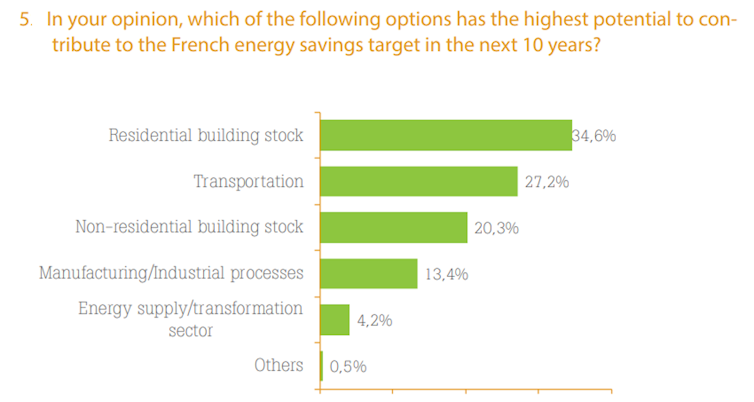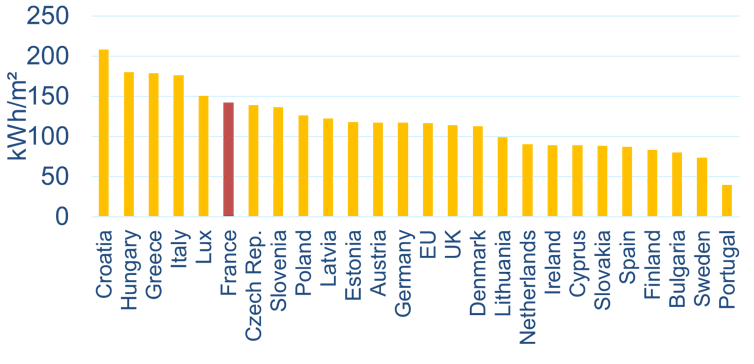In the wake of the Paris Climate Agreement, France has committed to cutting greenhouse gas emissions by 2050 to 75% below 1990 levels. To help achieve this ambitious target and as part of its energy transition strategy, France wants to lower final energy consumption to 50% below 2012 levels by 2050. The residential and non-residential building sector currently accounts for 45% of final energy consumption, 60% of heating consumption, and 27% of the country’s greenhouse gas emissions. Lowering energy use in this sector is thus a key strategy for achieving ambitious medium- and long-term energy and climate targets such as the carbon neutrality for the building stock by 2050.
In that context, the Energy Market Barometers conducted by Grenoble École de Management in June 2018 asked more than a hundred experts about their perception of the French energy policy targeting the building sector.

Author provided
The findings suggest that the residential building stock in France is considered to have the highest potential. Compared to other EU countries, the average performance of its building stock in terms of energy consumption is significantly higher. For example, the energy consumption per m2 for space heating for a French dwelling is 50% higher compared to a Dutch dwelling when adjusted for differences in climate conditions (see figure below). Thus, the French building sector offers substantial energy savings that may be realised in the coming decades.
Podium spot for French energy policy for buildings

Unit consumption per m2 for space heating scaled to EU climatic condition (residential, year 2015).“ /> In view of this energy saving potential, past French governments have implemented a number of policies, believed to be among the most complete and efficient in the world. The International Energy Efficiency Scoreboard (<a href= ODYSSEE
2018 edition) complied by the American Council for an Energy Efficient Economy (ACEEE) ranks France second among industrialised countries in terms of energy efficiency in the building sector. The mix includes regulations – for example, the French building code that requires all new buildings to meet "nearly zero energy building” (nZEB) standards – financial incentives (tax credits, subsidies), and information campaigns (the one-stop shop initiative PRIS).
Considering that around 55% of France’s current residential building stock was built before 1975 (the year when building codes were introduced in France), the French government focusses on thermal renovation, which the French Energy Minister termed a “national priority”. In the long run, France wants to reduce energy consumption in the building sector by 28% in 2030 and to bring the entire building stock to the nZEB levels by 2050. The latter means that the entire building stock is required to consume less than 50 kWh/m2/year or about 5.2 litres of petrol/m2/year.
In addition, all buildings should then be brought up to an “A” performance level (on an A-G scale), below which they could not be rented or resold. The government is also planning to spend 14 billion euros over five years to promote and accelerate the thermal renovation of buildings (including 4.8 billion euros dedicated to improve the thermal insulation of public-sector buildings).
Poor renovation performance despite ambitious targets
In April 2018 the French government launched the “Plan de rénovation énergétique des bâtiments” (the plan governing the energetic renovation of buildings). This plan foresees the thermal renovation of about 500,000 dwellings every year (of which half should target fuel-poor households), but it does not specify a required level of energy performance. For instance, in 2014, 3.5 million renovations have been completed in France, but, 41% of these have been so-called light renovations, where only one measure to improve the thermal performance of the building was implemented. Less than 10% of these renovations can be considered as a thermal renovation (i.e., with at least 45% energy savings). Clearly, if this level of performance is maintained France will not achieve the envisioned carbon neutrality for the building stock by 2050.
How to best achieve deep thermal renovation
The plan further foresees subsidies to promote step-by-step thermal renovations, which are expected to enable rapid initial energy savings. A majority (ca. 55%) of the French energy market experts believes that the government should support such step-by-step measures. About 30% disagree, and 15% do not know. Since implementing one measure at a time involves lower initial investment costs compared to a more comprehensive, single-step approach, a step-by-step approach may more easily overcome investors" financial constraints. In fact, the French government wants to vitalise this market and to renew its communication process to make renovation more attractive and affordable. Assuming that each building could achieve the nZEB standard via three subsequent steps (based on a building energy renovation passport, i.e. the “Passeport efficacité énergétique” (P2E)), the government expects to reach the target of decarbonizing the whole building stock by 2050.
However, implementing the measures sequentially may not be optimal and eventually involve higher costs. For example, a new heating system may turn out to be too large after later thermal insulation of walls, ceilings and windows. Finally, a step-by-step approach may lead to more discomfort and disruptions for households than a one-step approach. Recently, some innovative initiatives have been launched to overcome the barrier of high initial investment costs of a single-step deep renovation. For example, the DOREMI thermal renovation operational framework offers detached-homeowners and communities a simple framework that guarantees effective, cost-efficient retrofitting thanks to training and worksite assistance provided by groups of skilled tradesmen.
Despite its spot on the podium of the ACEEE policy ranking, more such initiatives appear to be needed if France wants to meet its medium and long term energy and climate targets for the building sector and beyond.



 Federal Judge Signals Possible Dismissal of xAI Lawsuit Against OpenAI
Federal Judge Signals Possible Dismissal of xAI Lawsuit Against OpenAI  Federal Judge Blocks Trump Administration Move to End TPS for Haitian Immigrants
Federal Judge Blocks Trump Administration Move to End TPS for Haitian Immigrants  US Judge Rejects $2.36B Penalty Bid Against Google in Privacy Data Case
US Judge Rejects $2.36B Penalty Bid Against Google in Privacy Data Case  BTC Flat at $89,300 Despite $1.02B ETF Exodus — Buy the Dip Toward $107K?
BTC Flat at $89,300 Despite $1.02B ETF Exodus — Buy the Dip Toward $107K?  CK Hutchison Unit Launches Arbitration Against Panama Over Port Concessions Ruling
CK Hutchison Unit Launches Arbitration Against Panama Over Port Concessions Ruling  Panama Supreme Court Voids Hong Kong Firm’s Panama Canal Port Contracts Over Constitutional Violations
Panama Supreme Court Voids Hong Kong Firm’s Panama Canal Port Contracts Over Constitutional Violations  California Sues Trump Administration Over Federal Authority on Sable Offshore Pipelines
California Sues Trump Administration Over Federal Authority on Sable Offshore Pipelines 
































